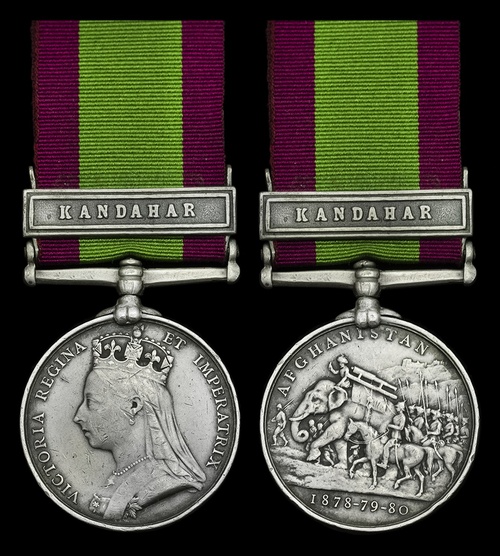
Auction: 24003 - Orders, Decorations and Medals
Lot: 244
The Afghanistan Medal awarded to Sepoy C. Jing, 30th Bombay Native Infantry (Jacob's Rifles), whose Regiment collapsed during the Battle of Maiwand, precipitating the disastrous British defeat
Afghanistan 1878-80, 1 clasp, Kandahar (Sepoy Choor Jing 30th Regt N.I.), suspension somewhat loose, polishing and contact marks, very fine
Choor Jing served with the 30th Bombay Native Infantry (Jacob's Rifles) and was present with them during the Second Afghan War. The Regiment was not newly raised however they did have a disproportionally high number of raw recruits during the campaign, most of whom had neither seen battle nor had adequate training. They arrived at Kandahar on 5 May 1880 and were still there two months later when news arrived of Ayub Khan declaring himself Emir of Afghanistan.
General Burrows was placed in command of a Brigade to confront Ayub Khan, with Jacob's Rifles forming part of the infantry complement. They arrived at Girishk on 11 July to find that the army of the loyal Wali of Kandahar had rebelled and was preparing to join Ayub Khan. Burrows swiftly attacked, dispersing the mutineers and seizing their guns before pursuing them up the Helmand Valley.
During the action it is said that Jacob's Rifles displayed a marked unsteadiness, although it is not clear whether this statement was made with the benefit of hindsight. Regardless, Burrows marched his command to face Ayub Khan alone, only to discover that the enemy army was considerably larger than initially believed, having been swelled by Ghazi warriors. The British anchored their line of the village of Khig to their right however the precipitous advance of their guns forced the line to advance over the dried ravine that had previously offered cover.
Jacob's Rifles were situated in the centre right of the line with four companies in the rear as a reserve. As the Battle began an artillery duel developed, and the Grenadiers stationed on the left wing began to take heavy fire from their exposed position. As such, two companies of the reserve were posted out to reinforce them. They also came under the heavy artillery fire as well as sniping from the nearby gullies and ravines which allowed the Afghans to get close without exposing themselves to return fire.
Casualties mounted especially amongst the officers and before long the inexperienced sepoys began to waver. At a crucial moment the smoothbore guns, also on the left flank, ran out of ammunition and began to withdraw - seeing this apparent loss of artillery the men of Jacob's Rifles broke and fled. As they did so the Afghan main body was pressing on the British line, allowing them to roll up the formation even as the fleeing sepoys disrupted their comrades.
The Regiment suffered losses of nearly 50% with three British and three native officers killed alongside 231 other ranks, and one British and four Native officers wounded alongside 25 other ranks. The survivors withdrew precipitously to Kandahar where they remained throughout the siege and later formed the reserve for General Roberts' army during the Battle. Jing survived the fighting and doubtless received his medal alongside his comrades at Calcutta on 19 April 1883; sold together with typed and handwritten research.
Subject to 20% VAT on Buyer’s Premium. For more information please view Terms and Conditions for Buyers.
Sold for
£270
Starting price
£110




